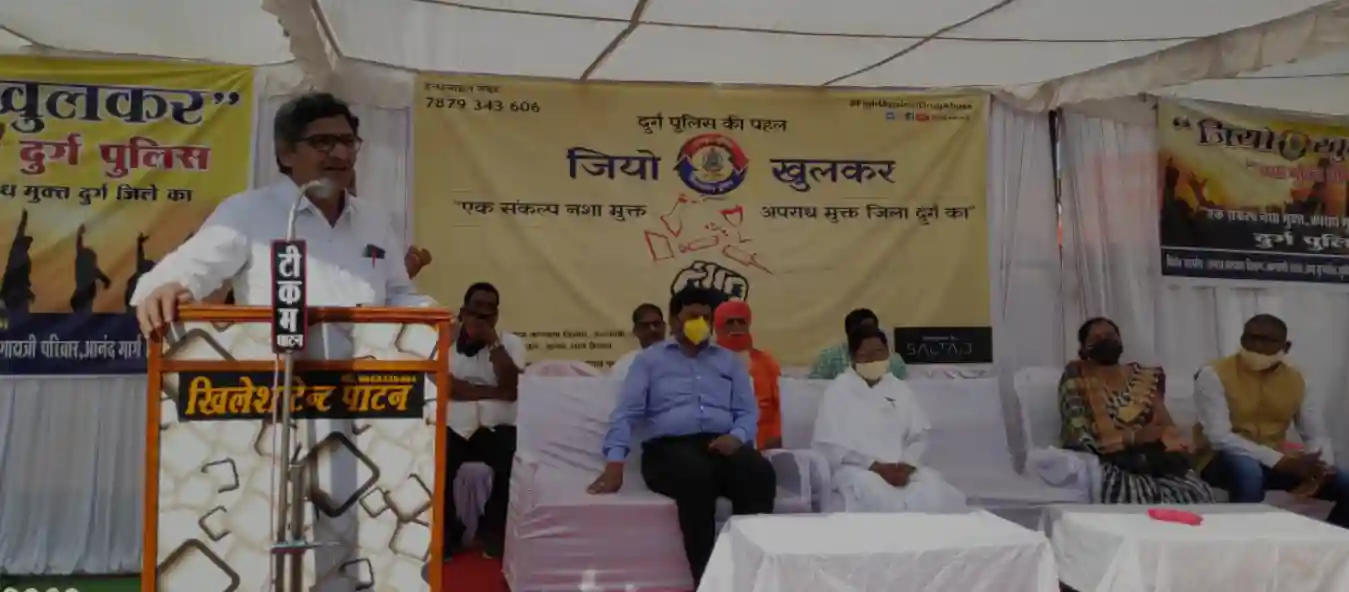
Drug De-Addiction Centre in Chhattisgarh
At Kalyani Social Welfare and Research Organization, we offer specialized services for those struggling with drug addiction. Drug De-Addiction Centre in Chhattisgarh treating a large number of drug addicts from the state at an affordable price. A large number of patients after receiving treatment are leading a drug free life. We have effective and customized treatment plans for drug abusers. At our rehabilitation facility, a group of skilled psychologists and medical professionals conduct an initial analysis of each patient. We also provide aftercare services and ongoing support to help our patients maintain their recovery once they complete their treatment program.
Reach us today to get the best treatment.
Making a Positive Change in Your Life after joining our Drug De-Addiction Centre in Chhattisgarh
At Kalyani's Drug De-Addiction Centre in Chhattisgarh, we understand that substance use disorders can take a significant toll on one's life and the lives of those around them. Our goal is to help individuals struggling with addiction to make a positive change in their lives by providing them with a safe and supportive environment to begin their recovery journey.
The Drug De-Addiction Centre in Chhattisgarh takes a holistic approach to addiction treatment, which means we focus on the whole person, not just their addiction. Our treatment programs incorporate various evidence-based therapies, including cognitive-behavioral therapy, motivational interviewing, and group therapy.
Personalized Treatment Plans at Our Drug De-Addiction Centre in Chhattisgarh
At the Kalyani Social Welfare and Research Organization, we believe that every patient's recovery journey is different from each other. This is why we provide personal treatment plans according to the patient's needs at our Drug De-Addiction centre in Chhattisgarh
Here are some of the key benefits of our personalized treatment plans, including:
With the right support and a treatment plan, healing becomes not just possible but lasting.
Services
About Us
Kalyani Social Welfare and Research Organization is Chhattisgarh's leading non-governmental, non-profit drug rehabilitation centre founded by ‘Mr. Ajay Kalyani’.
Contact Us
Aftercare Services and Ongoing Support at our Drug De-Addiction Centre in Chhattisgarh

At Kalyani Social Welfare and Research Organization's we offer a Drug De-Addiction Centre in Chhattisgarh. We understand that recovery from substance use disorders is a journey that requires ongoing support and care. That's why we offer aftercare services and ongoing support to our clients even after they complete their treatment program.
Our aftercare services are designed to help our clients successfully transition back into their daily lives and avoid relapse. Our Drug De-Addiction Centre in Chhattisgarh offers continued individual and group therapy sessions, relapse prevention education, and support groups. Our experienced and compassionate staff works closely with the clients to create a personalized aftercare plan that meets their unique needs and goals.
Holistic Approach to Addiction Recovery Drug De-Addiction Centre in Chhattisgarh

Detoxification
During this procedure, the addictive substance is entirely ceased, and withdrawal medications are administered.
Counselling
A client can develop into a conducive state of being that would enable him to no longer feel the desire to use alcohol or drugs through the use of counselling and meditation.
Meditation
All repressed and suppressed feelings and experiences are helped to surface through contemplation, and they are then addressed in ongoing follow-up sessions.
Therapy Sessions
These sessions begin long before the person is admitted to the facility so that the staff can assess the situation and provide the appropriate care.
Our Vision Behind Establishing the Drug De-Addiction Centre inChhattisgarh
In India, drug abuse poses significant challenges, particularly in states like Chhattisgarh, which ranks among the top states for substance abuse issues. According to the National Drug Dependence Survey 2019, approximately 2.8% of the population in Chhattisgarh is affected by substance use disorders, with a notable increase in opioid and alcohol dependence. The stigma surrounding addiction, lack of awareness, and limited access to treatment facilities exacerbate these challenges, making recovery difficult for many individuals.
Kalyani Social Welfare and Research Organization addresses these issues by providing affordable, customized treatment plans at our Bhilai-based Drug De-Addiction Centre in Chhattisgarh. Our skilled team conducts thorough assessments and offers ongoing support, ensuring that patients not only overcome addiction but also maintain their sobriety through comprehensive aftercare services. We are committed to transforming lives and fostering a drug-free community in Chhattisgarh.
5 Questions to Ask Before Choosing the Best De-Addiction Centre in Chhattisgarh
Choosing the right de-addiction centre is a critical step toward recovery. It’s important to make an informed decision to ensure you or your loved one receives the best care and support. Here are five important questions to ask before selecting the best drug de-addiction centre in Chhattisgarh:
- What Treatment Options Do You Offer?
- Are the Staff Qualified and Experienced?
- What Is the Environment Like?
- What Support Do You Provide After Treatment?
- What Are the Costs and Payment Options?
It’s important to know the types of treatments the centre provides. Ask about detox programs, therapy sessions, counseling, and any other specialized treatments. A good Drug De-Addiction Centre in Chhattisgarh, like Kalyani, will offer a range of services that are tailored to each individual’s needs.
The staff at the centre should be trained and experienced in treating addiction. Ensure that they have qualified doctors, counselors, and caregivers, like those at Kalyani, who are well-equipped to provide the best care during recovery.
The environment plays a huge role in recovery. Ask about the living conditions, cleanliness, and overall atmosphere of the centre. A safe, clean, and comfortable environment can help make the recovery process smoother.
Recovery doesn’t stop when the program ends. Find out what aftercare support is provided, such as follow-up counseling, support groups, and relapse prevention. Ongoing support is crucial for long-term success.
Understand the costs involved and what services are included. Some centres offer flexible payment options or financial assistance programs. However, Kalyani Social Welfare and Research Organization is Chhattisgarh's leading non-governmental, non-profit drug de-addiction centre, offering nominal charges only.
Aftercare Services and Ongoing Support at Our Drug De-Addiction Centre in Chhattisgarh
At Kalyani Social Welfare and Research Organization, we understand that recovery from substance use disorders is an ongoing process. Completing a treatment program is only the first step. To support long-term recovery, we provide structured aftercare services and continuous support for all individuals who complete their treatment at our Drug De-Addiction Centre in Chhattisgarh.
Our aftercare services are designed to help patients transition back into their daily lives with stability and confidence. We offer continued individual counseling, group therapy sessions, relapse prevention education, and support groups. Each patient receives a personalized aftercare plan based on their specific needs and circumstances.
Our team remains committed to guiding every individual through their recovery journey even after treatment, ensuring they have access to the support and resources necessary to maintain a healthy, substance-free life.
How Long Does it Take to Recover Drug Addicts at a Drug De-Addiction Centre in Chhattisgarh?
The recovery process from drug addiction varies for each individual, depending on several factors like the type of addiction, its severity, and how the person responds to treatment. At our Drug De-Addiction Centre in Chhattisgarh, we offer personalized care to help individuals recover at their own pace.
Factors Affecting Recovery Time:
Type and Severity of Addiction – Severe addictions may take longer to recover from, while milder cases may see improvement in a shorter time.
Detoxification – The initial detox phase can last anywhere from a few days to weeks, depending on the substance used.
Personalized Treatment Plans – The time required for recovery depends on how well an individual responds to the tailored treatment plan, which includes therapy, counseling, and medical care.
Emotional and Mental Healing – Addiction often impacts mental health, and emotional recovery can take several months, even after physical healing.
Aftercare and Ongoing Support – Continued support after treatment is essential for long-term success. Aftercare services, such as counseling and support groups, help maintain sobriety.
Typical Recovery Timelines
While recovery times can vary, here’s a general timeline:
30–60 Days: Most patients begin to feel better physically and emotionally, and they start developing coping skills.
3–6 Months: Many individuals continue their treatment through outpatient programs or therapy sessions and experience a significant improvement in their lifestyle and mental health.
12 Months or More: For some, long-term recovery may take a year or longer. Ongoing aftercare and support are essential during this phase to help avoid relapse and build a stable, drug-free life.
At Kalyani Social Welfare and Research Organization, we are dedicated to helping individuals recover with comprehensive treatment and support. Recovery times vary, but with the right care and guidance, long-term sobriety is achievable.
Why Choose our Drug De-Addiction Centre in Chhattisgarh ?
The Drug De-Addiction Centre in Chhattisgarh is equipped to address the underlying causes of addiction, such as trauma, mental health conditions, and family dynamics. We are aware that every addiction can be a complex issue. Our staff is also trained in the latest evidence-based practices in addiction treatment, including cognitive-behavioral therapy, motivational interviewing, and trauma-informed care.

